- Home
- Lucius Shepard
Beautiful Blood Page 5
Beautiful Blood Read online
Page 5
“You don’t sound like you mean it.”
“Oh, but I do!” Iciness slipped into her voice. “I’ve never doubted you, Richard. You’re far more accomplished a criminal than ever you were a scientist.”
“This is good news for both of us,” he said, electing not to respond in kind, not wanting to alienate her further. “You’re certainly due your share of congratulations. The plan was our plan, not mine alone, and I would never have had the gumption to carry it through without your support.”
“You sound as if you’re speaking at a testimonial dinner. Do I get a gold watch, too?” Her laugh was brittle, a single disparaging note.
“This Cattanay,” she went on. “Do you think it wise to allow him to proceed with his plans? What if the poison works more swiftly than he anticipates?”
“I’ll stop him before he can do any real harm. With Arthur in position at the head of the militia, no one will be able to thwart us. Until then, Cattanay’s project is of such scope, it’ll deflect attention.”
He heard people talking in the street below and the crazed yapping of a dog, abruptly cut off and replaced by a whimper. Her flowery scent seemed to intensify; her eyes, large and dark and liquid, appeared lit from within.
“Aren’t you hungry?” she asked.
“I thought I was, but…no.”
Following another patch of silence, she said, “Well…” She sat up and undid the fastening of the peignoir, letting it slip from her shoulders to reveal a breast. When he displayed no reaction, she lifted a breast and made a lascivious show of licking her nipple, keeping her eyes on him all the while.
“Stop it!” he said angrily.
Dropping into the patois she had once used with her clientele at the brothel, she said teasingly, “You mus be a jumbie mon, you don wan to slip-slide wit this fine gyal.”
“Stop!”
She stared at him heatedly. “Isn’t this what you wanted?”
“What I wanted…” He gave his head a violent shake, frustrated by her misreading of him. “Yes, that’s part of it, but I wanted more, I wanted…”
“Would you like me to fetch another woman? Perhaps the two of us could please you.”
“That’s not what I meant by ‘more.’”
She watched dispassionately as he positioned himself cross-legged on the pillows.
“We were friends once, weren’t we, Ludie? More than friends. We used to talk for hours, we…” Rosacher made a fist, as if he intended to pound on something; then he relaxed his fingers and lowered his hand. “I hoped we could go back to how things were.”
“Then you’re a fool, Richard. It’s sweet in a way. It’s all that’s left of the boy I met in Morningshade. And you were a boy. You had a boy’s passion, a boy’s recklessness. But your passion has changed into a lust for wealth, and your recklessness has matured into ruthlessness. You don’t see that in yourself. You’ll pay it lip service, you’ll admit to it. But you don’t really see it and so you remain a fool.”
Full darkness had fallen—the windowpanes like black semaphore flags salted with a message of stars. She had spoken with such mildness that her characterization of him had the tenor of sage counsel.
“I love you,” Rosacher said.
“No, you had a feeling. Your brain sparked and you had a feeling. You said to yourself, I’ve got to get back with Ludie, back to how things used to be. Even though how you thought things were, that truly wasn’t how they were. You know that, but you want to deny it. You want to hold onto that feeling, because it’s the only one you’ve had lately that has nothing to do with business.”
Everything she said diminished him. He thought that if she kept talking, he would wind up the size of a homunculus, a tiny man sitting on a vast pillow, a plush island upon which he’d been marooned.
“I’m a fool, too,” she said. “There was a time I thought I loved you. I knew all the love in me had been dragged out and kicked into the street, but I hung onto that thought. Love was something I could dream about whenever some foul-smelling bastard was riding me. It was a story I’d been told. A fairytale. But I couldn’t hold on for long. It passed…and your feeling will pass as well. In a week you’ll be consumed with something else.”
“We’re friends, though, aren’t we?” Rosacher said. “We’re at least friends.”
“We have a bond, but…”
“Yes?”
“I owe you everything, Richard. My life. Money. Freedom.” She tapped the side of her head. “You taught me how to use this, and how to behave like a lady. I’m grateful for that. It’s why I stay. But for that very reason, because you did everything, because you lifted me up from Morningshade, I can’t help resenting you. I still feel owned, owing you so much, and that feeling trumps friendship.”
“That’s absurd. You don’t owe me a thing, and you don’t have to stay. I can get someone else to manage the books.”
A wounded look crossed her face. It pleased him to recognize that he could yet hurt her, that she was not without emotion where he was involved.
“I’ll stay until it’s right to leave. And when I go, it won’t be farther away than the other side of the hill, where I won’t have to look at that damned lizard every time I step out the door.”
She reached between two pillows, withdrew a lacquered box and put it on the table; she removed from it a pipe with a long, straight stem and a brass bowl, the image of a miniature dragon raised on its surface. “This is what you want. To touch that night again, the night Arthur came into our lives. I think it’s what we both want. Things have gotten crinkly between us and this is what we need to straighten it all out.”
“Thank you, no.”
Ludie packed the bowl with a bed of moist tobacco. “Have you forgotten how to play?” She embedded a grayish white pellet of mab in the tobacco. “I think you have. I think you forgot the instant the idea for the business came into your head. One minute you were the Richard I knew. A sweet, intemperate boy. The next, you were acting smooth as a bishop on Sunday morning. Can’t nothing catch on you now, you’re so smooth.”
She took a match from the box, ignited it with the nail of her thumb, and lit the pipe. Her cheeks hollowed as she drew in smoke. She leaned back amid the pillows, letting smoke trickle out between her parted lips. “Ohh…” she said breathily, and gave a delicate shudder. She closed her eyes for a second and drew in more smoke. After a third lungful, she looked as if she filled out her skin more thoroughly, as if she had ripened all in a moment. Her eyes were brighter, a’dance with gleams.
“Touch me,” she said, lightly slurring.
With reluctance, for part of him, the lesser part, wanted to resist this fake, this chemical fraud, he gloved the side of her breast, rubbing the nipple in a circular motion with the ball of his thumb. Her eyelids fluttered down and she bit her lower lip and made a musical noise, barely audible, a noise with which he was most familiar, though he had not heard it for many months. To hear it now affected him strangely. It raised the flag of his desire, yet he also felt a chill, as if her arousal endangered him. She caught his hand, brought it to her mouth and licked the tip of his forefinger. In her face he saw the refinements of love—her features had softened, her gaze was doting, her manner one of fervid devotion.
“Richard…” she said, leaving the remainder of the sentence unspoken, yet not unheeded.
A horse and rider went by on the street, the percussive sound of its hooves fading to muted pops. Shamed by his weakness, Rosacher picked up the pipe.
6
That night Rosacher dreamed of a cavernous room with a slight curvature to its ceiling, so long that neither end was visible. Upon the walls of the room flowed the black-on-gold patterns of Griaule’s blood, like the cryptic symbols written by God upon a serpent’s scales, seeming characters in a long-forgotten script. And perhaps it was the dragon’s bloodstream in which he stood, unaffected by its currents, breathing without difficulty, altogether comfortable and calm, for whenever he shifted about
the patterns rippled and distorted as if his movement had disturbed a liquid medium. He tried to focus on the pattern, to track a single shape as it changed and changed again. To his bewilderment, one of the shapes straightened and grew larger, resolving into an anthropomorphic figure that approached him at a brisk pace. A man, judging by the size, yet Rosacher assumed him to be a preternatural creature. As the man drew near, Rosacher saw that his hands were wrapped in bandages and he was attired in a black suit with an unfashionably long jacket. Another bandage obscured the left side of his face and a slouch hat with its brim turned down shadowed his features, subduing a tangle of graying hair. There was no chair, yet he sat and crossed his legs as if there were a chair beneath him, one fashioned of the flowing black-and-gold blood.
“Hello, Richard,” he said at length in a grating voice.
Rosacher, startled to hear him speak, stepped backward, slipped and would have fallen had not the blood supported him, forming a cushion-like surface into which he sank.
“What is this place?” Rosacher asked, struggling to sit up—the pillowy stuff beneath him was so slick, he had difficulty achieving a stable position.
The man chuckled.
“We’re inside Griaule, are we not?” asked Rosacher, glancing about, searching for some further clue to substantiate the notion.
“In one way or another, we are always inside Griaule,” said the man. “On the brightest day, we are part of his shadow.”
This declaration bore the stamp of an oft-repeated phrase and Rosacher bridled at it, as he would at anything that smacked of zealotry.
“Who are you?” he demanded.
“A messenger.”
“Have we met? You appear to know me.”
“We have a minimal acquaintance, yet I doubt you would acknowledge it. But I know you well enough, though I had forgotten how callow you were.”
The man loosed a terrible, racking cough that doubled him over. On recovering, he fussed with his lapels and smoothed down the fabric of his trousers, as if worried lest they wrinkle.
“Be careful when next you wake,” he said, wheezing, his voice raspier than before. “Do not react to anything you may hear or see. Don’t cry out for help. Slip from the bed as quietly as you can. Your enemies are near.”
“Am I asleep now?”
“You are, yet this is no dream. Heed my warning or you will not see daybreak.”
“If not a dream, what is it? A sending of some kind?”
“Don’t be preoccupied with the nature of the experience. Listen to me!”
The man was possessed by a second coughing fit, of longer duration than the first, and Rosacher volunteered to examine him if he so wished, saying that the cough suggested some deep-seated malady.
“It’s nothing,” said the man, struggling for breath. “Did you hear what I told you to do?”
“Yes. Don’t say anything. Slip from my bed.”
“Quietly!”
“Yes, yes. I understand. Quietly. I’d see to that cough if I were you.”
It occurred to Rosacher that it was the height of idiocy to offer medical advice to someone who might be a figment of his imagination, yet he inquired of the man as to what portion of reality he might represent. Was he an embodiment of the dragon, the image sent to deliver a message, or a living person co-opted for that purpose? And how had he acquired this foreknowledge of his, Rosacher’s, fate?
“Were I to answer ‘yes’ to your first two questions, I would not be far off the mark,” the man said. “Your third question requires a more complicated answer. Though he was once a mortal creature, long-lived yet born to die, Griaule has grown not only in size, but also in scope. Demiurge may be too great a word to describe him, but he is akin to such a presence. An incarnation, if you will. His flesh has become one with the earth. He knows its every tremor and convulsion. His thoughts roam across the plenum, and his mind is a cloud that encompasses our world. His blood…” He made a florid gesture that seemed to include the entire surround. “His blood is the marrow of time. Centuries and days flow through him, leaving behind a residue that he incorporates into his being. Is it any wonder that he knows our fates?”
“Nonsense,” Rosacher said, annoyed by the man’s unctuous certitude. “Griaule is a lizard. A monumental lizard who may possess some potency, an ability to influence the weak-minded; but he is nonetheless a lizard and thus mortal. He bleeds, he breathes, and he will die.”
“He will die when he wishes to die,” said the man. “As do all perfected souls who give their light to the world. But I came to warn you, not to debate philosophical matters.”
“This is scarcely a debate. There is nothing at issue.”
The man stood and studied Rosacher. “You are a fool, but in Griaule’s design there is a place for fools. Do you not wonder why I was sent?”
“No more than I’m inclined to wonder about why my ass itches. I assume it’s because of an irritation, something disagreeable that caused an adverse reaction.”
The man shook his head ruefully and said, “I almost wish my warning would be in vain.” He then gave a curt salute and strode off at the same rapid pace with which he had approached, merging with the other dark figures carried by the dragon’s blood.
As unnerved by the man’s abrupt exit as he had been by his advent, Rosacher called after him, not wishing to be alone in that solitude. When he did not reappear, Rosacher braced himself with the thought that the man might have proven even more annoying had he stayed. The patterns of the blood troubled his sight. He closed his eyes, yet continued to see them in his mind’s eye and was seduced by their consistent flow, their ceaseless evolution and by the intimations he began to receive from them—shimmers of emotion, fragmentary landscapes, pieces of memory all, but memories that he did not recognize for his own, like the glints of ornamental carp glimpsed beneath the surface of a golden pond.
He woke into a pitch-dark room, rain driving against the walls of the house, a firm mattress and satin sheets beneath him, and had a sense of familiar enclosure. His room, his house. He fumbled for a candlestick, but recalled the man’s warning. It was the height of the ridiculous to heed a warning voiced in a dream, and yet the dream had been so unusual in form and substance, he was compelled to give it credence. Holding his breath, he eased from beneath the covers. The floor was cold. He crept away from the bed, wary of creaking boards, and groped his way along the wall until he located a corner. He stood with his back pressed against the angle of the walls, and began to feel even more foolish for having obeyed the compulsion of a dream. A noise alerted him and he froze in place. A clock ticked, the rain drummed. The cold of the floor spread through his limbs, and then a flurry of noise came from the bed, sounding as if someone were taking a mallet to the pillows. Rosacher edged toward the door, groped for the knob, and was blinded by a dazzling light. His eyes adjusted and he made out a cowled figure kneeling on the bed, a shadowed face peering in his direction, a dagger in one hand and holding aloft in the other what looked to be a starry, blue-white gemstone, the source of the radiance.
The assassin sprang for him, a nightmare of flapping robes and an empty cowl. Rosacher was bowled over by the attack, but succeeded in grabbing the man’s knife-arm, securing his wrist, and they went rolling across the carpet at the foot of the bed. For an instant Rosacher gained the upper hand, straddling the assassin, but the man whipped him onto his back—effortlessly, it seemed—and came astride him, forcing the dagger toward Rosacher’s throat. The point of the blade scored his jaw. He cried out, a desperate shout, and sought to dislodge the assassin by bucking with his hips, directing his remaining energies toward diverting the blade. Light still issued from the gemstone fallen to the floor, but he could see nothing of his attacker’s face. The assassin shifted his grip on the hilt of the dagger, relaxing downward pressure for a split-second, and Rosacher seized the opportunity to cry out again. The dagger nicked him twice more, once in the shoulder and once on the collarbone. He suffocated in the mustiness
of the man’s woolen robe, in the pepper-and-onions scent of his last meal. With a surge of energy, realizing he had no chance fighting from his back, Rosacher brought his knee up hard into the assassin’s back, driving him forward, and scrambled from beneath him, regaining his feet, panting, gulping in air. The assassin came up into a crouch and feinted with the dagger…and then the door burst open, lantern-light cut the dimness, and three of Rosacher’s servants rushed into the room. Hesitating but a moment, they leaped at the assassin and bore him to the floor. Arthur appeared in the doorway, pistol in hand, clad in a nightshirt that fell to his bony knees. Drained of his reserves, Rosacher staggered to the bed and sat. The assassin lay without struggling in the grip of the three men, one of whom had received a slash across the arm. His cowl had fallen back, revealing him to be a mere boy of sixteen or thereabouts, towheaded and with a baby-ish face. He seemed to be praying, his eyes shut, lips moving silently. Rosacher watched him without pity.
“It’ll take more than prayer to bring you through this night,” he said.
The boy’s eyelids fluttered, but he continued to pray.
“Are you injured?” Arthur asked.
“Not badly.” Rosacher pointed to the gemstone on the floor. “Here. Hand it to me.”
Arthur scooped it up. “It’s one of the Church’s baubles.”
The gem was warm to the touch, about the size of a peach, faceted on its uppermost surface. It no longer shone. After a cursory examination, Rosacher tossed it onto the bed.
“What are you doing here?” he asked Arthur.
The giant adopted a sheepish expression. “I was induced to stay by your new kitchen girl. Good thing, as it turned out.”
“Where’s Ludie?”
“I don’t think she’s back from her ride. She said she’d be gone ’til tomorrow.”
A maid peeked in the door and Arthur told her to fetch bandages and ointment. Still unsteady, Rosacher stood and clung to the bedpost for support. Arthur asked once more if he was all right. Rosacher ignored the question and waved at the assassin. “Take him to the cellar and question him. And send someone to the barracks. I’ll need a force of twenty men.”

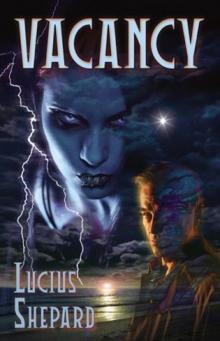 Vacancy & Ariel
Vacancy & Ariel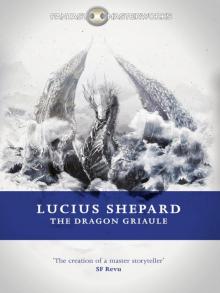 The Dragon Griaule
The Dragon Griaule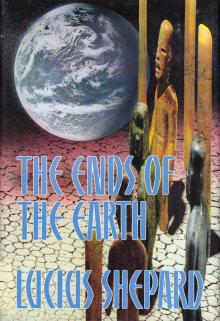 The Ends of the Earth
The Ends of the Earth Two Trains Running
Two Trains Running Life of Buddha
Life of Buddha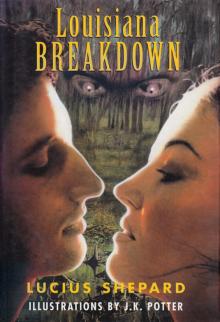 Louisiana Breakdown
Louisiana Breakdown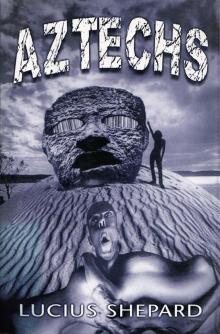 AZTECHS
AZTECHS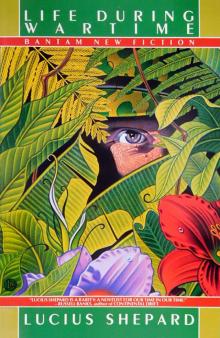 Life During Wartime
Life During Wartime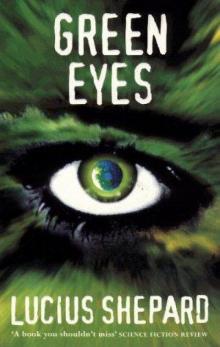 Green Eyes
Green Eyes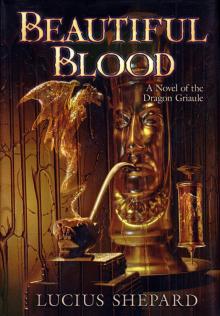 Beautiful Blood
Beautiful Blood Stars Seen Through Stone
Stars Seen Through Stone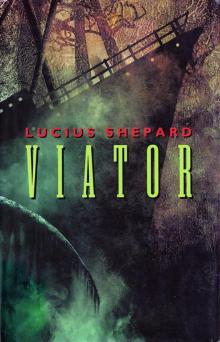 Viator
Viator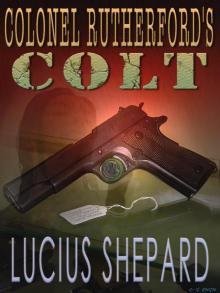 Colonel Rutherford's Colt
Colonel Rutherford's Colt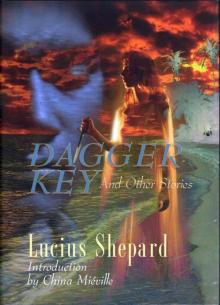 Dagger Key and Other Stories
Dagger Key and Other Stories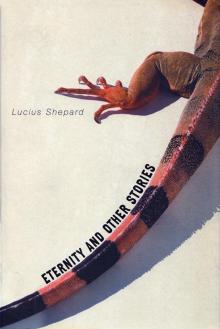 Eternity and Other Stories
Eternity and Other Stories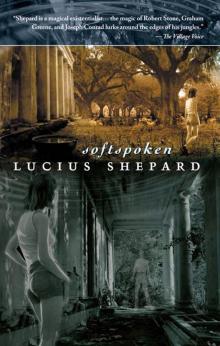 Softspoken
Softspoken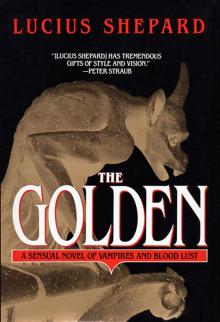 The Golden
The Golden